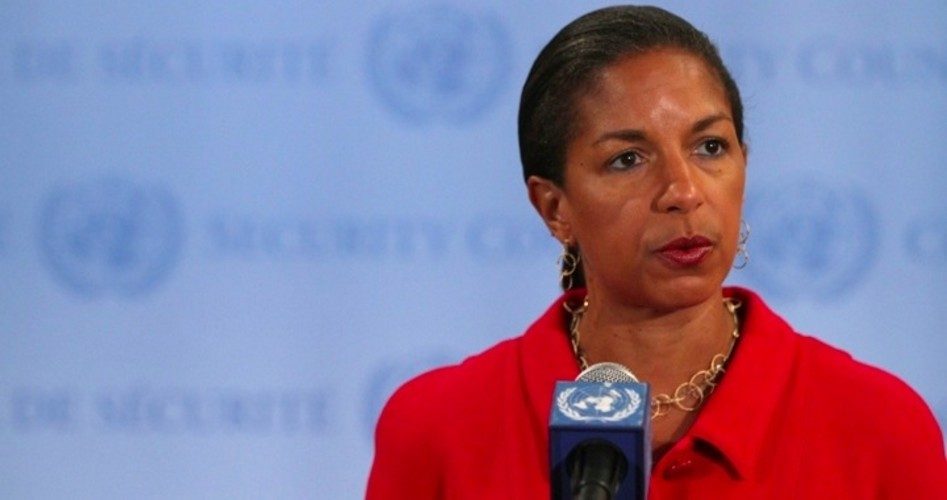
Hillary Clinton has long said that she will not serve a second term as President Barack Obama’s secretary of state, and with her tenure coming to an end conflict has already arisen over Obama’s likely nomination to replace her, current U.S. Ambassador to the United Nations Susan Rice.
Rice was in the thick of the controversy surrounding the terrorist attack on the U.S. compound in Benghazi, Libya, initially insisting that the assault that claimed the lives of U.S. Ambassador Chris Stevens and three others was the result of a spontaneous protest that erupted over an amateur online video critical of Islam.
Among those expressing their concerns over Rice’s nomination was U.S. Senator Lindsey Graham (R-S.C.), who told CBS’ Face the Nation: “I’m not entertaining, promoting anybody that I think was involved with the Benghazi debacle. We need to get to the bottom of it. The President has a lot of leeway with me and others when it comes to making appointments, but I’m not going to promote somebody who I think has misled the country or is incompetent. That’s my view of Susan Rice.”
Senator John Kerry (D-Mass.) was also initially mentioned as a potential nominee for secretary of state, but is now being widely discussed as Leon Panetta’s replacement as secretary of defense. The New York Times reported that while the White House would have less trouble sliding Kerry through the confirmation process, his departure from the Senate would leave his seat open to a Republican challenge, perhaps from former GOP Senator Scott Brown, who lost his own seat in the elections to Democrat Elizabeth Warren.
If confirmed Rice would be the second black woman to serve as secretary of state, following Condoleezza Rice (no relation), who served under George W. Bush. Susan Rice, who worked in the Clinton administration as a National Security Council director, joined Obama’s presidential campaign in 2007, helping Obama craft his foreign policy platform.
Business Week reported that Rice advocated for U.S. aid to Libyan rebels who opposed the country’s longtime U.S. funded dictator Moammar Gadhafi, and she helped push through the UN Security Council’s support for a resolution authorizing intervention in the war-torn nation. Reported Business Week: “Her push for intervention, officials said, might in part have been a product of the failure of former President Bill Clinton’s administration to intervene to halt genocide in the central African nation of Rwanda, when Rice was 30 and serving on the National Security Council staff.”
As for Rice’s comments about what prompted the Benghazi attack, the New York Times reported that Obama “stoutly defends Ms. Rice, noting that in her remarks on Benghazi, she was reading from a briefing prepared by the intelligence agencies…. ‘Anyone who opposes Susan, based on one day’s comments, will have to reconcile that with what the intelligence said on that day,’ said an administration official….”
In the two months since the attack, media reports make it apparent that from the beginning U.S. intelligence — and the White House — knew far more than they let on in the hours after the assault, with strong speculation that the president watched the attack unfold in real time in the comfort of a White House briefing room.
Reports that CIA operatives on the ground were repeatedly denied assistance and told to “stand down” when they wanted to rescue trapped U.S. Ambassador Chris Stevens and staff have led to a full-blown congressional investigation into the attack.
Graham said that under the circumstances, Rice “would have an incredibly difficult time getting through the Senate. I would not vote for her unless there’s a tremendous opening up of information explaining herself in a way she has not yet done.”
Other Republican senators have agreed that Rice’s supposed misstatement on the attack casts doubt on her fitness for the top State Department post. “It’s clear that at a minimum she made misrepresentations and misstatements on Benghazi on every major news network, and so I think those questions have to be answered,” Senator Kelly Ayotte (R-N.H.) told Politico.com. “And so I have serious questions about her being put in the position of Secretary of State.”
Noting that intelligence officials and the White House had real-time access to the attack, making it clear that it was a well-planned terrorist operation rather than a “spontaneous” protest, Senator Bob Corker (R-Tenn.), who is likely to be the top Republican on the Senate Foreign Relations Committee, said “it is beyond me that [Rice] would be out publicly talking about that event [as sparked by a spontaneous demonstration]. It’s beyond belief.”
And Senator John Barrasso (R-Wyo.), another member of the Foreign Relations Committee, insisted that Rice “disqualified herself as Secretary of State because in that role you need to have somebody with sound judgment, who is able to ask tough questions in situations which are stressful. And I think she failed in light of Benghazi and the reports she did five days later.”
Photo of U.S. Ambassador to the UN Susan Rice: AP Images


